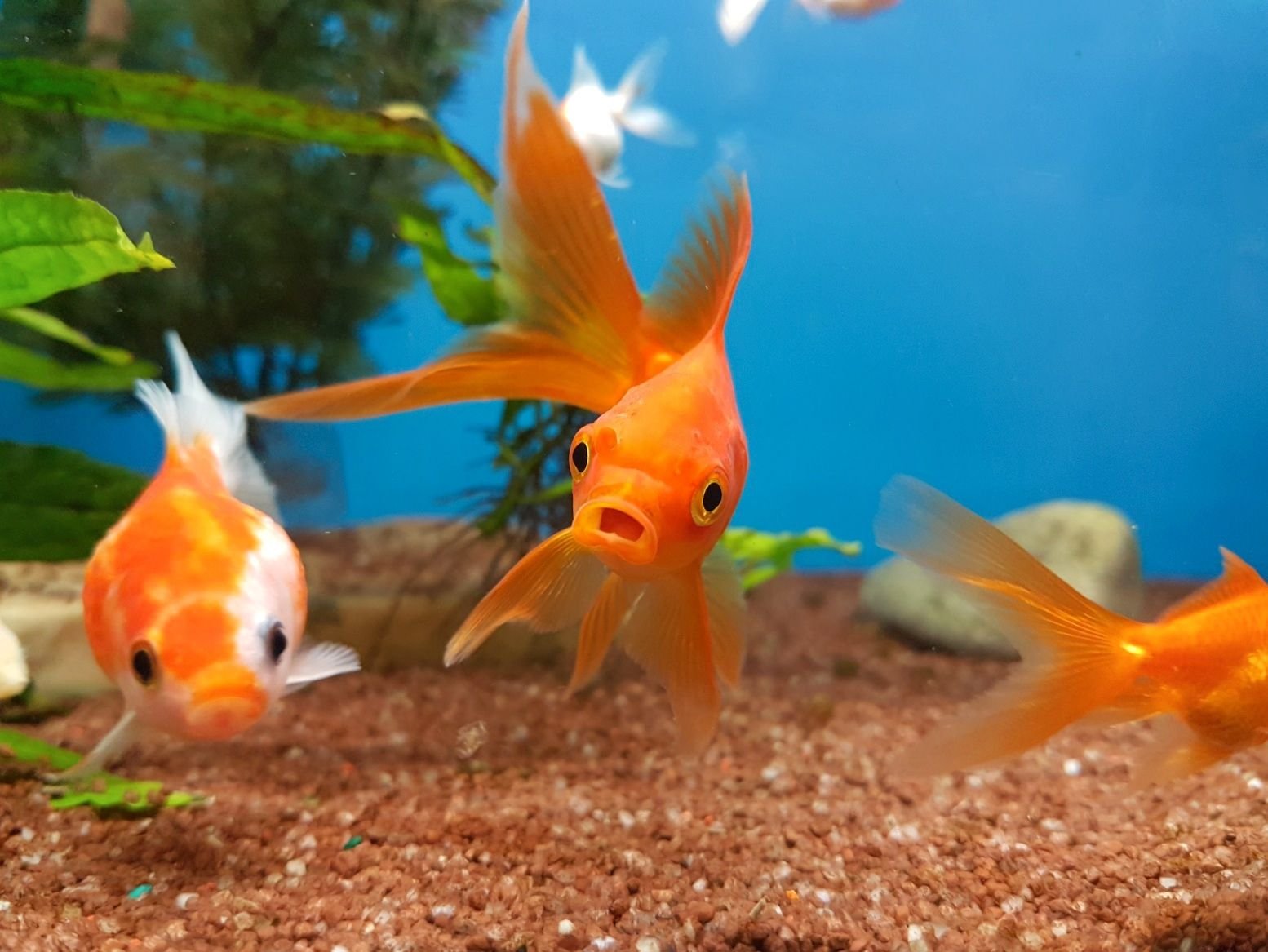If you’ve ever had to leave your goldfish alone for a few days, you’ve probably wondered , how long will a goldfish live without food? Whether you’re going on vacation or simply forgot to feed your finned friend, it’s a question every goldfish owner has asked at least once.
The good news? Goldfish are remarkably resilient creatures. However, there’s a fine line between survival and good health. In this guide, you’ll learn exactly how long goldfish can go without food, what factors affect their survival, and how to ensure your pet stays healthy even when you’re away.
Understanding Goldfish Feeding Behavior
Natural Eating Habits of Goldfish
Goldfish are omnivores, meaning they eat both plant and animal-based food. In the wild, they spend their days foraging for algae, insects, and small crustaceans. They’re grazers by nature, nibbling throughout the day rather than eating in large, infrequent meals.
In an aquarium, though, things are different. Since they rely on you for food, they can’t naturally forage so skipping meals for too long can stress them out. Still, goldfish have evolved to survive temporary shortages of food by slowing down their metabolism and conserving energy.
Fun fact: Goldfish belong to the carp family, and carp can survive long periods of food scarcity in cold water environments. That’s part of what makes your goldfish tougher than they look.
How Goldfish Metabolism Affects Survival
A goldfish’s metabolism is temperature-dependent. The warmer the water, the faster their metabolism and the quicker they burn through energy. In cooler water, their metabolism slows, allowing them to survive longer without food.
Here’s what that means for you:
- In warm tanks (75°F or above), goldfish need more frequent feeding.
- In cooler tanks or ponds (below 68°F), they can go longer without food since their body functions slow down.
So when you ask how long can a goldfish live without food, the water temperature is one of the most important factors.
Factors That Affect How Long a Goldfish Can Live Without Food
There’s no single answer how long your goldfish can survive depends on several variables. Let’s break them down.
1. Size and Age of the Goldfish
- Young goldfish (under 6 months): Need frequent feeding since they’re growing rapidly. They can survive 2–4 days without food.
- Adult goldfish: Have better fat reserves and slower metabolism, allowing them to live 10–14 days without eating.
| Goldfish Type | Approximate Survival Time Without Food | Notes |
| Baby Goldfish | 2–4 days | Needs small, frequent feedings |
| Adult Goldfish | 10–14 days | Can store energy more efficiently |
| Pond Goldfish | Up to 3 weeks | May feed on natural algae/insects |
2. Tank Conditions and Water Quality
Clean water isn’t just about clarity it’s life support for your goldfish. Poor water quality leads to stress, disease, and faster deterioration when food is absent.
Key factors to monitor:
- Ammonia and nitrate levels: Should remain close to zero.
- Oxygenation: Proper aeration ensures healthy respiration.
- Temperature: Consistent temperature prevents metabolic shock.
If the tank is dirty, your goldfish might struggle to survive even a few days without food. On the other hand, a clean, filtered, well-oxygenated tank helps them endure for over a week.
3. Health and Previous Feeding Patterns
Healthy, well-fed goldfish have stored nutrients in their bodies. They can last longer compared to underfed or sick fish.
If your fish has been eating a balanced diet, including pellets, vegetables, and occasional protein sources it’s far more likely to endure a temporary fast.
“A well-fed goldfish can survive hunger. An underfed one can’t survive neglect.”
Consistency in feeding and good nutrition beforehand are the biggest predictors of survival.
So, How Long Can Goldfish Actually Live Without Food?
On average, a healthy adult goldfish can survive 8 to 14 days without food. However, survival doesn’t mean thriving. Going this long without nutrients can weaken their immune system and make them more prone to disease once feeding resumes.
Here’s a quick comparison of different environments and survival times:
| Environment | Average Duration Without Food | Survival Notes |
| Indoor Aquarium | 10–14 days | Dependent on water temperature |
| Outdoor Pond | Up to 3 weeks | Algae and insects provide extra food |
| Small Bowl | 3–5 days | Limited oxygen and waste buildup reduce survival time |
If you’re planning a trip longer than a week, you’ll need to arrange a feeding plan we’ll cover that next.
What Happens When Goldfish Don’t Eat?
Skipping a meal or two won’t hurt, but prolonged fasting triggers a few noticeable changes.
Short-Term Effects (First Few Days)
- Reduced activity
- Less interaction or swimming
- Hiding behavior
- Slow digestion
Goldfish often enter a conservation mode, lowering energy usage to survive.
Long-Term Effects (After a Week or More)
- Muscle loss and visible thinning
- Weak immune system
- Increased risk of parasites or infection
- Organ stress or potential failure
Even if your goldfish survives, starvation can cause lasting internal damage. It’s always better to plan ahead than to rely on their endurance.
How to Care for Your Goldfish When You’re Away
Leaving town? Don’t worry you can keep your goldfish safe and fed with a little preparation.
1. Use Automatic Feeders
These handy devices dispense pre-set amounts of food at scheduled times. Perfect for trips under two weeks.
Pros:
- Prevent overfeeding
- Easy to set up
- Reliable with good batteries
Cons:
- Can clog with moist food
- Requires testing before you leave
2. Try Feeding Blocks or Vacation Feeders
Vacation feeding blocks slowly dissolve, releasing food over several days.
| Type | Duration | Pros | Cons |
| Weekend Block | 2–3 days | Simple setup | Can overfeed if not monitored |
| Vacation Block | 7–14 days | Long-lasting | May cloud the water |
These are useful for short trips but not ideal for extended vacations, as they can alter water chemistry.
3. Ask a Friend or Neighbor
If you’ll be gone for more than two weeks, it’s safest to have someone feed your goldfish.
Leave clear written instructions, including:
- Exact food type and portion size
- Feeding frequency
- Emergency contact (in case of water or filter issues)
A small measuring spoon helps prevent overfeeding accidents.
4. Prepare the Tank Before You Leave
Before heading out:
- Perform a 25–30% water change
- Clean filters and check air pumps
- Remove uneaten food or waste
- Set the tank light on a timer
These steps ensure stable conditions while you’re away.
Myths About Goldfish Starvation
Let’s clear up a few common misconceptions about goldfish and food:
- Myth 1: Goldfish can survive indefinitely by eating algae.
While they might nibble on algae, it doesn’t provide the nutrients they need. - Myth 2: Goldfish don’t need feeding every day.
They do small, frequent meals mimic their natural grazing behavior. - Myth 3: They’ll be fine if left for a month.
Untrue. Even hardy pond goldfish start suffering nutrient deficiencies after three weeks.
“Surviving isn’t the same as thriving healthy feeding habits mean a happy, active goldfish.”
Tips for a Healthy Goldfish Feeding Routine
Maintaining a proper feeding schedule keeps your fish strong, colorful, and lively.
Best practices:
- Feed 2–3 times daily in small amounts (whatever they can eat in two minutes).
- Alternate between high-quality pellets, fresh vegetables (like peas or spinach), and live/frozen foods (like brine shrimp or daphnia).
- Avoid overfeeding it’s one of the most common causes of poor water quality and goldfish illness.
Final Thoughts: Keeping Your Goldfish Happy and Healthy
So, how long will a goldfish live without food? The simple answer: usually up to two weeks, depending on their health and environment. But survival isn’t the goal , well-being is.
Plan ahead when you’re away. Use an automatic feeder, prepare your tank, or ask someone you trust to help. Remember that your goldfish depends entirely on you for food and care.
A healthy feeding schedule, clean water, and attentive care will ensure your goldfish doesn’t just survive it thrives.

